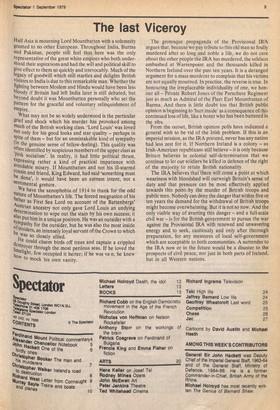The last Viceroy
Half Asia is mourning Lord Mountbatten with a solemnity granted to no other European. Throughout India, Burma and Pakistan, people still feel that here was the only representative of the great white empires who both understood their aspirations and had the will and political skill to give effect to them so quickly and irrevocably. Much of the legacy of goodwill which still startles and delights British visitors to India is due to this remarkable man. Whether the fighting between Moslem and Hindu would have been less bloody if Britain had left India later is still debated; but beyond doubt it was Mountbatten personally who set the Pattern for the graceful and voluntary relinquishment of empire,
What may not be so widely understood is the particular grief and shock which his murder has provoked among Much of the British working class, 'Lord Louis' was loved not only for his good looks and star quality — perhaps in Spite of them — but for an unmistakable kind of sympathy (in the genuine sense of fellow-feeling). This quality was often identified by suspicious members of the upper class as 'Pink socialism'. In reality, it had little political thrust, expressing rather a kind of practical impatience with avoidable misery. If Mountbatten and not his ill-starred Fousin and friend, King Edward, had said 'something must be done', it would have been an earnest intent, not a sentimental gesture. We have the xenophobia of 1914 to thank for the odd rature of Mountbatten's life, The forced resignation of his father as First Sea Lord on account of the Battenbergs' fi.iustrian ancestry not only gave Lord Louis an undying aFtermination to wipe out the stain by his own success; it !is° put him in a unique position. He was an outsider with a opathy for the outsider, but he was also the most inside t insiders, an intensely loyal servant of the Crown to which ne was so closely allied. , could charm birds off trees and captain a crippled io.estroyer through the most perilous seas. If he loved the 'Limelight, few occupied it better; if he was van, he knew now to mock his own vanity.
The grotesque propaganda of the Provisional IRA argues that, because we pay tribute to this old man so foully murdered after so long and noble a life, we do not care about the other people the IRA has murdered, the soldiers ambushed at Warrenpoint and the thousands killed in Northern Ireland over the past ten years. It is a deranged argument for a mass murderer to complain that his victims are not equally mourned. In practice, the reverse is true. In honouring the irreplaceable individuality of one, we honour all — Private Robert Jones of the Parachute Regiment just as much as Admiral of the Fleet Earl Mountbatten of Burma. And there is little doubt too that British public opinion is beginning to 'hurt inside' as a consequence of this continued loss of life,like a boxer who has been battered in the ribs.
From the outset, British opinion polls have indicated a general wish to be rid of the Irish problem. If this is an imperial mission, as the IRA pretend, never has any nation had less zest for it. If Northern Ireland is a colony — as Irish-American republicans still believe — it is only because Britain believes in colonial self-determination that we continue to let our soldiers be killed in defence of the right of the majority to retain British nationality.
The IRA believes that there will come a point at which weariness with bloodshed will outweigh Britain's sense of duty and that pressure can be most effectively applied towards this point-by the murder of British troops and public men. Nobody can deny the danger that within five or ten years the demand for the withdrawal of British .troops might become overwhelming. But it is not so now. And the only visible way of averting this danger — and a full-scale civil war — is for the British government to pursue the war against the Provisional IRA with renewed and unwavering energy and to seek, cautiously and only after thorough preparation, for any measures of local self-government which are acceptable to both communities. A surrender to the IRA now or in the future would be a disaster to the prospects of civil peace, not just in both parts of Ireland, but in all Western nations.






























 Previous page
Previous page